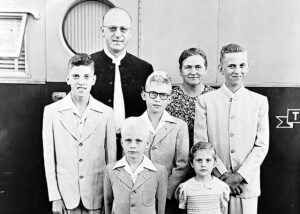Never thought there would be Sundays without singing.
Like churches across Canada, ours has been shuttered as a precaution against the novel coronavirus. I understand why this must be, but I sure miss getting together and joining our voices.

We’re a singing church, a trait that is often mentioned by first-time visitors who typically say something like, “Wow, you guys sure like to sing.”
Our enthusiasm for singing is passed from generation to generation. When babies are introduced to the congregation, they’re welcomed with song. When these same babies are old enough to speak, they’re old enough to sing with us. They grow up singing in Sunday school, in kids’ club, in youth group and at church camps.
No one applauds our singing. It’s not a performance. Rather, it’s a way to practise unity by listening carefully to the voices around us and trying to blend as God’s people.
We sing as a way to connect with something greater than ourselves. We sing with gratitude as we count our blessings. We sing with repentance as we remember how we goofed up in the past week.
But not this year. Our church was closed during Lent, doctor’s orders.
Churches are usually safe sanctuaries when the world seems bleak. A heartening side effect of belonging to a faith community is that all have rituals and traditions for supporting members through the big events of life, both good and bad: births and deaths, marriages and divorces, coming of age and moving to the nursing home.
But these rituals and traditions are at odds with physical distancing. With all the fear and suffering resulting from COVID-19, it’s a time when we most need our faith families, but we’ve been forced to disperse. Call it the pandemic paradox: being together is the best way to cope with hardships caused by the virus, but the virus is the reason we have to stay apart.
When we’re not threatened by COVID-19, the comfort of physical touch abounds in our church family with lots of handshakes and full-on hugs. We can’t hug from six feet away.
We all have mail slots in the church foyer, which are used to receive notes from our church friends. These notes—the best ones are hand-written on nice stationery—console us in times of difficulty or thank us for doing something right. The church is now locked, so we can’t get at our mail slots.
The church kitchen is often a busy hub where apron-clad volunteers prepare food that brings the church family together to share a meal that’s liberally flavoured with fellowship. The grills and coffee pots are now gathering dust.
We regularly visit members who are in hospital, in nursing homes, or those who are shut-ins. But now, we’re all shut-ins.
Yes, the restrictions of COVID-19 have prompted some of us to keep in contact with phone calls and emails, but those modes of communication are cold comfort compared to the face-to-face friendliness of engaging friends at the weekly coffee hour.
Several of us tried to sing together on Zoom recently but it was a disaster, although a funny disaster. None of us knew that the app doesn’t allow all parties to sing simultaneously, so the attempted singalong ended in giggles because we could hear only one singer’s voice while the live-streamed video showed the other participants moving their mouths soundlessly, like fish.
During Holy Week, we had held tight to one final hope that, even with the physical distancing restrictions, there was still a way to get together. Our church traditionally kicks off Easter Sunday morning with an outdoor sunrise service, in which we gather at dawn and stand atop a hill in a Winnipeg city park and sing to the rising sun, sometimes with accompaniment from honking geese.
After our church building was closed, we initially thought we could still sing on Easter morning on a hill, standing far enough apart to respect the distancing decree. But on March 27, it was announced that public gatherings in Manitoba could not be larger than 10 people. That ended our last chance to celebrate Easter together this year.
While isolated from our church family, I worry most of all about how they’re managing. They include frontline health workers, small-business owners seeing their financial futures plummet, and people with pre-existing health problems for whom contracting COVID-19 would likely be a death sentence.
With about 500 members in our church, it’s possible one or more will test positive before this is over. And the rest of us can’t be there to sing with them through their despair.
Many lessons will emerge from this pandemic, but I’ve already learned one lesson: singing solo is lonely. I long for the church doors to open so we can gather and again make a joyful noise.
Carl DeGurse is a member of Douglas Mennonite Church in Winnipeg, Man. A version of this piece was published on April 11 in the Winnipeg Free Press.
Related story:
Watch: A virtual Mennonite Easter choir







